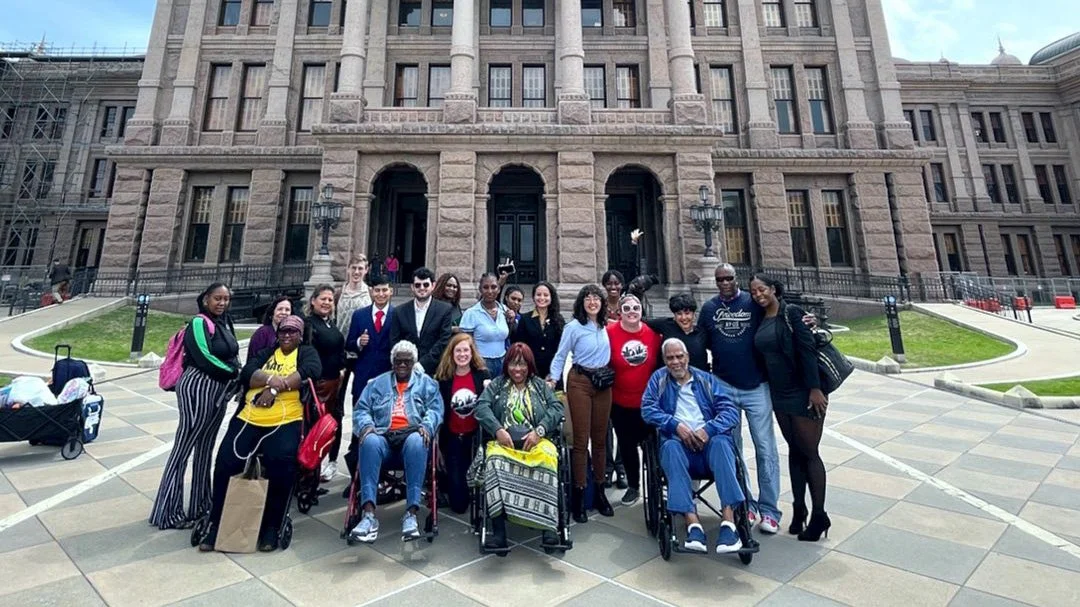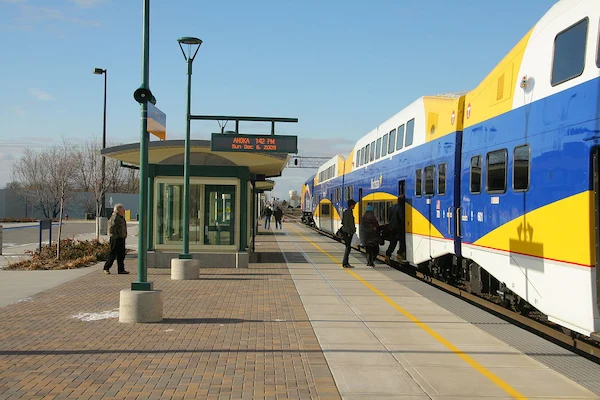Despite living steps from the path of the North Houston Highway Improvement Project (NHHIP), Stephany V remembers learning of it through TikTok, rather than from the Texas Department of Transportation (TxDOT). In that TikTok, she learned of the project’s nearly $10 billion price tag, how its construction would level hundreds of homes, restaurants, and acres of parkland, and how adding lanes doesn’t mitigate congestion. She also, for the first time, learned she could actually have a say in the process.
The TikTok, posted in summer 2022 by Natalia Moreno, went viral. Moreno was moved to post on the app because social media was exactly how she stayed up to date about TxDOT’s plans, herself. In fact, she learned of the NHHIP while residing directly in its path, thanks to a post on Stop TXDOT I-45’s Instagram account. And even though she’s since moved elsewhere in the city, many of her friends and relatives still live in neighborhoods destined for demolition. Yet, many of those friends and neighbors wonder whether they would have ever learned of the agency’s plans ahead of the bulldozers, if it weren’t for the advocacy of people like Moreno and groups like Stop TxDOT.
“I knew what TxDOT was, you know,” said Stephany V. “They go into presentations at school, but it wasn't ever anything like to the point where we knew that we had like an input in everything that goes on around us. So prior to [the Tiktok] I had no idea that they even held public meetings. Furthermore, if I knew I could voice my opinion on what's happening in my community, I felt like I would have gotten involved much, much earlier.”
Now, she and Moreno are active in the opposition to the NHHIP with Stop TxDOT, and part of their advocacy is bridging the gap in communications. In other words, they’re filling in where they see TxDOT has failed. In doing so, however, they’re noticing how many of the barriers appear to be built in by design.
Feeling Unwelcome in Austin
The most decisive meetings and hearings occur in Austin, the state’s capital, which is a roughly 162-mile, three-hour drive from Houston. Mid-week morning meetings necessitate arranging childcare, forfeiting a day’s work, and finding a substitute to cover a shift on short notice as agendas are posted with little lead time. A meeting may begin at 8 a.m., but the opportunity to comment may not open until 2 p.m.—yet the expectation for those eager to get their voice on the record is to be present for as long as possible. Moreno, Stephany, and their colleagues in Stop TxDOT have repeatedly left Houston before sunrise to make it into Austin’s chambers by 8 or 9 a.m.
They wish they could tune in online, but the meetings aren’t live streamed, nor is there an opportunity to provide comment remotely. “You can send an email but there’s no confidence anyone will read it,” Moreno added. The sessions are usually available online afterwards, up to 48 hours after they’ve taken place. For advocates, however, that’s two days after irreversible decisions have been set in motion.
In TxDOT’s materials for this and other projects, it appears public participation is encouraged. There’s usually one corner of every flyer or webpage that states how the public can get in touch or provide their input. Yet, when advocates go to Austin, they feel anything but welcomed.
At the meetings themselves, opportunities to speak are limited, require preparation and rehearsal, and at worst appear futile. “You can be pouring your heart out about how a highway has impacted you and they will just be looking at the wall and not even making eye contact,” Stephany described. “It’s very demeaning.”
Who’s Left Out of the Conversation
The unsupportive atmosphere advocates describe would intimidate most, but what they also note is that some are left out of the conversation entirely.
“Every Spanish speaker that I’ve spoken with who was in the direct path of the proposed feeder roads or interchanges had no idea what was happening,” Stephany described. “More to the point: they had no idea they could even voice their concerns.”
With over 30% of Harris County claiming Spanish as their first language, she sees this as a tragic oversight.
Yet, Spanish translation should’ve become a more routine feature of TxDOT’s communications after it reached a Memorandum of Understanding (MOU) with Harris County in late 2022. That MOU came after Harris County filed a federal lawsuit against TxDOT, challenging the latter’s timeline and procedure. It effectively settled the lawsuit. In it, TxDOT promised to provide Spanish translations, fund and design greenways, and assist residents already displaced by the highway.
For advocates, however, it was a discouraging development in the fight against the NHHIP. Throughout the lawsuit, they saw an ally in Harris County and an opportunity to hold the state agency accountable. The signing of a legally non-binding agreement, therefore, forfeited a key point of pressure.
Furthermore, they still aren’t seeing enough materials offered in Spanish—though Moreno adds that even if materials were provided in Spanish, the opportunity to comment appears limited to English. In her experience, no Spanish interpreters have been available in the many times she’s traveled to Austin to get her opposition to the NHHIP on record.
- Read: “TxDOT Chooses Highways Over Housing.”
Despite the adversarial tenor of the meetings in Austin, the unfulfilled commitments of the MOU, and shrinking confidence that their voice matters, Stop TxDOT continues to show up. At the very least, they want their resistance on the record. And as people who proudly call Houston home, they also want to secure a future wherein they can thrive.
“When we’re in these meetings, one thing is apparent,” Moreno stated. “We’re the generation that will actually have to live through these changes.”





